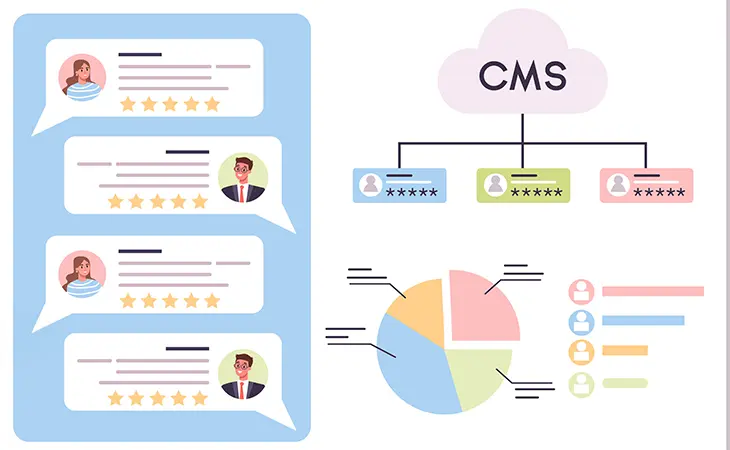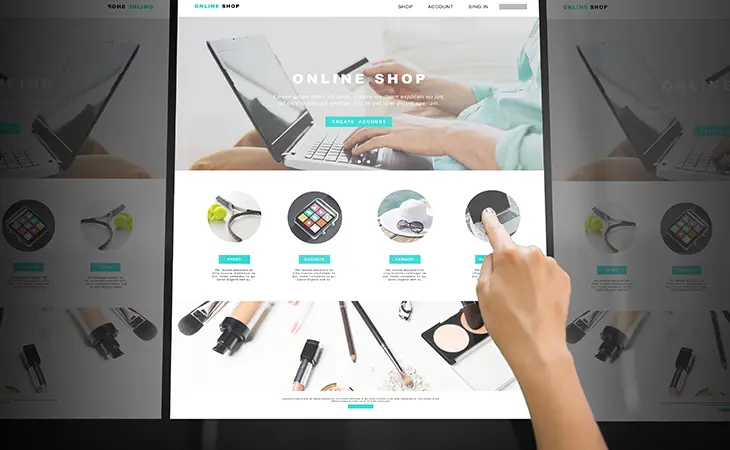Efficiency is key for any business, and if efficiency is key then choosing the right CMS for your business is one of the most critical decisions for any company looking to establish or enhance its online presence. It’s the foundational platform upon which your entire website will be built, influencing everything from design flexibility and functionality to long-term scalability and cost. This crucial website platform decision requires careful consideration of the many available options, making a thorough CMS comparison for business essential.
This multi-part series aims to demystify the leading best CMS platforms for business: WordPress, Shopify, and custom-built solutions. Our goal is to help you make an informed choice that aligns with your specific business goals.
What is a CMS (Content Management System)?
Before we dive into the specifics of platforms like WordPress, it’s essential to understand what a CMS is and why it’s so critical for your online success. A CMS, or Content Management System, is a software application that allows you to create, manage, and modify content on a website without needing specialized technical knowledge or coding skills. Think of it as the friendly dashboard that lets you control your website’s content, design, and functionality.
Why Your Business Needs a CMS: Empowering Your Online Presence
As a business owner, a robust CMS isn’t just a convenience; it’s a strategic asset for choosing the right CMS for your business. It empowers you to control your digital narrative and adapt quickly in the fast-paced online world. Here’s why a CMS is indispensable for your business website platform:
Easy Content Updates: Update text, images, videos, and publish new blog posts without needing a developer for every change. This keeps your site fresh and relevant.
No Coding Required for Basics: Most CMS platforms offer intuitive interfaces, allowing you to manage content through user-friendly editors, freeing you from needing to learn HTML or CSS for daily tasks.
Improved Collaboration: Multiple team members can contribute to and manage website content, streamlining your marketing and communications efforts.
Enhanced Functionality: Easily add features like contact forms, image galleries, e-commerce stores, booking systems, or SEO tools through built-in options or extensions.
Better SEO Potential: A good CMS provides tools and structures that make it easier to optimize your website for search engines, helping customers find you online.
Scalability for Growth: As your business evolves, your CMS can grow with you, allowing you to add new pages, features, and content without rebuilding from scratch.
Consistency in Branding: Maintain a consistent look and feel across your entire website, reinforcing your brand identity.
Now that we understand the fundamental role of a CMS, let’s begin our deep dive into the specific platforms available when choosing the right CMS for your business.
Step 1: WordPress – The Powerhouse CMS
WordPress, often synonymous with “website” for many, began its journey as a simple blogging platform. Today, it powers over 43% of all websites on the internet, evolving into a robust and incredibly versatile Content Management System. But with great popularity comes a need for careful consideration when choosing the right CMS for your business. Is WordPress the ideal business website platform for your company? Let’s explore its key advantages and disadvantages, aiding in your website platform decision.
The Advantages: Why WordPress Excels When Choosing the Right CMS for Your Business
The enduring popularity of WordPress isn’t accidental. It offers a compelling array of benefits that make it an attractive option for businesses of all sizes, from startups to large enterprises. These advantages are crucial when you are choosing the right CMS for your business and exploring the best CMS platforms for business.
-
Unparalleled Flexibility and Customization: WordPress’s greatest strength lies in its adaptability. With thousands of themes (pre-designed layouts) and plugins (add-on functionalities), you can create virtually any type of website imaginable. Need an e-commerce store (making it a viable option among e-commerce CMS options), a professional portfolio, a booking system, or a membership site? There’s almost certainly a theme and plugin combination that can achieve it. This makes WordPress a highly versatile solution for businesses with unique needs, truly aiding in choosing the right CMS for your business.
-
Vast Ecosystem and Community Support: Being open-source and widely used means a massive global community constantly developing new tools, providing support, and sharing knowledge. This translates into a wealth of free and premium themes, plugins, and readily available online resources, tutorials, and forums. If you encounter an issue, chances are someone else has too, and a solution is within reach. This robust ecosystem significantly enhances the functionality and longevity of any WordPress site, making it a strong contender in any CMS comparison for business.
-
Excellent for SEO (Search Engine Optimization): Out of the box, WordPress is built with SEO in mind. Its clean code and logical structure are appreciated by search engines. Furthermore, powerful plugins like Rank Math provide comprehensive tools to optimize your content, meta descriptions, headings, and more, helping your business website platform rank higher in search results and attract more organic traffic. This is a crucial factor when choosing the right CMS for your business.
-
Cost-Effective Scalability: While a premium theme or plugin might incur an initial cost, the open-source nature of WordPress itself is free. You primarily pay for hosting, domain registration, and potentially professional design and development services. As your business grows, WordPress can easily scale with you. You can add new features, expand your content, and handle increased traffic without needing a complete platform overhaul, offering excellent long-term value when making a website platform decision for your growing enterprise.
-
User-Friendly Content Management: The WordPress dashboard is intuitive, allowing non-technical users to easily publish blog posts, update pages, manage media, and more, once the site is set up by professionals. This empowers business owners to maintain their content efficiently, without constant reliance on developers for minor updates. This ease of use is a significant factor in choosing the right CMS for your business and is often highlighted in any CMS comparison for business.
The Disadvantages: Considerations for Your Business Website Platform
Despite its many advantages, WordPress isn’t a silver bullet. There are certain aspects that businesses need to be aware of, especially when considering a self-managed approach, as part of understanding the full CMS pros and cons. These considerations are vital when choosing the right CMS for your business.
-
Security Responsibility: As an open-source platform, WordPress can be a target for hackers if not properly secured and maintained. You (or your web design partner) are responsible for implementing security measures, keeping themes and plugins updated, and regular backups. Neglecting these can leave your business website platform vulnerable, a critical point in the website platform decision.
-
Maintenance and Updates: To ensure optimal performance and security, WordPress core, themes, and plugins require regular updates. While this sounds simple, conflicts between different components can sometimes arise, requiring technical expertise to resolve. Failing to update can lead to security vulnerabilities or broken functionalities on your site. This ongoing responsibility is a key point in any thorough CMS comparison for business.
-
Performance Can Vary: The performance of your WordPress site (i.e., its speed) heavily depends on your hosting provider, the quality of your chosen theme, the number and type of plugins you install, and image optimization. A poorly optimized WordPress site can be slow, leading to a poor user experience and negatively impacting your SEO. This is a critical factor when choosing the right CMS for your business.
-
Steep Learning Curve for Advanced Customization: While basic content management is easy, achieving highly customized designs or complex functionalities often requires coding knowledge (HTML, CSS, PHP) or reliance on experienced web developers. For businesses without in-house technical staff, this can mean ongoing costs for design and development services, impacting your overall website platform decision and the long-term cost of your business website platform.
-
Plugin Overload and Conflicts: The abundance of plugins is a blessing, but also a potential curse. Too many plugins can slow down your site, introduce security risks, or even conflict with each other, causing errors. Choosing reputable, well-supported plugins is crucial, and professional oversight is often beneficial to avoid these common CMS pros and cons when choosing the right CMS for your business.
Is WordPress the Right Choice for Your Business?
Ultimately, the website platform decision to use WordPress for your business website platform hinges on your specific needs, budget, and desired level of control. If you value flexibility, extensive customization options, powerful SEO capabilities, and are prepared to either manage the technical aspects yourself or invest in professional maintenance, WordPress offers an incredibly robust foundation. It’s particularly well-suited for content-heavy sites, complex business logic, and those who want full ownership and control over their digital asset, making it a strong contender among the best CMS platforms for business.
At Rocket Web Designer, we specialize in crafting high-performing WordPress websites that are not only visually stunning but also secure, scalable, and optimized for lead generation. We understand the nuances of this powerful CMS and can guide your business through its potential, ensuring you harness its strengths while mitigating its challenges, helping you confidently in choosing the right CMS for your business.
Part 2: Shopify: The Dedicated E-commerce Solution
Shopify is a leading subscription-based e-commerce platform that allows anyone to set up an online store and sell their products. Unlike WordPress, which is a general-purpose CMS with e-commerce capabilities added via plugins, Shopify is built from the ground up specifically for online selling. For many, the website platform decision for an online store often comes down to Shopify due to its focused approach. Let’s break down the Shopify CMS pros and cons.
The Advantages: Why Shopify Excels for E-commerce Businesses
For any business with a primary goal of online sales, Shopify offers a compelling set of advantages. These are key considerations when choosing the right CMS for your business with an e-commerce focus.
-
Purpose-Built for E-commerce: Shopify’s core strength lies in its specialization. Every feature, from product listings and inventory management to secure payment processing and shipping tools, is designed specifically for online retail. This dedicated focus streamlines the process of setting up and managing an online store, making it a premier choice among e-commerce CMS options.
-
Exceptional Ease of Use: One of Shopify’s biggest appeals is its user-friendliness. It’s a fully hosted solution, meaning you don’t have to worry about server maintenance, software updates, or security patches – Shopify handles all the technical backend work. This allows business owners to concentrate on sales, marketing, and product development without getting bogged down in website management, simplifying the website platform decision.
-
Robust Security and Reliability: As a fully managed platform, Shopify takes care of crucial security aspects like SSL certificates, PCI DSS compliance (essential for handling credit card information), and data backups. This provides peace of mind for both merchants and customers, knowing that transactions are secure and the website platform is reliable. This level of built-in security is a significant factor when choosing the right CMS for your business if you process payments.
-
Extensive Sales & Marketing Features: Shopify offers a rich ecosystem of apps and integrations tailored for e-commerce. This includes tools for email marketing, SEO, social media integration, dropshipping, customer reviews, and analytics. It also supports multiple sales channels, allowing you to sell across your website, social media, and marketplaces, making it a powerful business website platform for online growth.
-
Scalability for Growth: Shopify plans are designed to scale with your business. Whether you’re a small startup making a few sales a month or a large enterprise processing thousands of orders, Shopify can handle the volume. Upgrading your plan provides access to more advanced features and greater capacity, making it a scalable option among the best CMS platforms for business.
The Disadvantages: Where Shopify Requires Careful Consideration
While Shopify is a fantastic platform for e-commerce, it’s important to understand its limitations when making your website platform decision. These are crucial aspects to weigh in a CMS comparison for business.
-
Transaction Fees (Beyond Subscription): While Shopify offers various subscription plans, if you choose to use third-party payment gateways instead of Shopify Payments, you will incur additional transaction fees on top of your payment gateway’s fees. This can eat into profit margins, especially for high-volume sales.
-
Less Flexibility for Non-E-commerce Content: Shopify is excellent for product-focused content, but its blogging and general content management capabilities are not as robust or flexible as a general-purpose CMS like WordPress. If your business relies heavily on intricate content marketing or has complex non-e-commerce pages, this could be a limitation. This is a key point in understanding the CMS pros and cons.
-
Limited Design Freedom Without Coding: While Shopify themes are generally beautiful and mobile-responsive, significant design customizations often require knowledge of its templating language (Liquid) or hiring a developer. This can be less flexible than WordPress for highly unique site structures or designs that deviate significantly from a theme’s standard layout.
-
Monthly Subscription Costs: Unlike the open-source WordPress, which is free to download (you pay for hosting and development), Shopify is a SaaS (Software as a Service) platform with recurring monthly subscription fees. While this covers hosting and maintenance, it’s an ongoing operational cost that must be factored into your budget when choosing the right CMS for your business.
-
Ownership and Portability: With Shopify, you “rent” the platform; you don’t own the underlying software or code. If you decide to migrate away from Shopify in the future, moving your content (especially product data and customer information) can be less straightforward than with a self-hosted solution, impacting your long-term website platform decision.
Is Shopify the Right Choice for Your Business?
If your business primarily revolves around selling products online and you value ease of use, built-in security, and a comprehensive suite of e-commerce tools, Shopify is likely an excellent option when choosing the right CMS for your business. It simplifies the complexities of online retail, allowing you to get an attractive and functional store up and running quickly. It’s particularly ideal for small to medium-sized businesses, dropshippers, and anyone seeking a streamlined e-commerce solution without extensive technical overhead.
At Rocket Web Designer, we have extensive experience building and optimizing Shopify stores that not only look great but also drive sales. We can help you navigate the platform, customize your store, integrate essential apps, and develop a marketing strategy to ensure your online shop thrives. We understand the nuances of e-commerce CMS options and can help your business thrive.
Part 3: The Tailored Fit – Custom Solutions
In our journey to simplify choosing the right CMS for your business, we’ve explored the versatile WordPress and the e-commerce powerhouse Shopify. While these platforms offer robust solutions for many, some businesses have unique requirements that off-the-shelf systems simply cannot meet. This brings us to our final category in this CMS comparison for business: custom website solutions. Here, we delve into why a custom-built business website platform might be the ultimate choice for specific needs, along with its inherent considerations.
Custom Website Solutions: Precision Tailoring for Your Business
A custom website solution means building a website from scratch, tailored precisely to your business’s exact specifications. This isn’t about adapting a theme or installing plugins; it’s about crafting every line of code, every design element, and every function to perfectly align with your unique processes, goals, and brand identity. When choosing the right CMS for your business, a custom solution offers unparalleled freedom and power, but it comes with its own set of trade-offs. Let’s examine the CMS pros and cons of this bespoke approach.
The Advantages: Why a Custom Solution is Often the Best CMS for Your Business
For businesses with highly specialized needs or ambitious long-term visions, the benefits of a custom website solution can be transformative. This is where the true power of a unique business website platform shines.
-
Unmatched Flexibility and Unique Functionality: This is the ultimate benefit. A custom solution means your website can do exactly what you need it to do, without compromise. You’re not limited by themes, plugins, or platform restrictions. If you have complex workflows, proprietary tools, or a distinctive customer journey, a custom build can integrate all these elements seamlessly, providing a truly unique online experience. This makes it an ideal choice when choosing the right CMS for your business that stands out from the competition.
-
Superior Scalability and Performance: Because the code is built specifically for your needs, it can be highly optimized for performance, security, and future growth. There’s no “bloat” from unnecessary features or conflicting plugins often found in off-the-shelf systems. This leads to faster loading times, a smoother user experience, and the ability to handle massive traffic and data volumes as your business expands. It’s truly a long-term website platform decision.
-
Enhanced Security: Custom solutions, when built by experienced professionals, can offer a higher degree of security because they are not common targets for mass attacks that exploit known vulnerabilities in popular platforms. Your security measures are specifically tailored and hardened against threats relevant to your business, offering peace of mind that’s invaluable for your business website platform.
-
Full Ownership and Control: With a custom solution, you own the entire codebase. This gives you complete control over every aspect of your website, including future development, integrations, and migration options. You’re not tied to a vendor’s terms of service or pricing changes, which is a powerful consideration when choosing the right CMS for your business.
-
Perfect Brand Alignment and User Experience: Every detail, from the visual design to the user flow, is crafted to match your brand identity and optimize the user experience for your specific audience. This leads to a highly cohesive and memorable online presence that reinforces your brand’s unique value proposition.
The Disadvantages: The Trade-offs of a Bespoke Business Website Platform
While the benefits are significant, it’s crucial to understand the inherent challenges of custom solutions. These are important CMS pros and cons to weigh in your website platform decision.
-
Higher Initial Cost: Building a custom website from the ground up requires substantial upfront investment in design, development, and testing. This is significantly more expensive than starting with a template-based platform. For many businesses, especially startups, this higher entry barrier is a major factor when choosing the right CMS for your business.
-
Longer Development Time: The process of planning, designing, coding, and testing a custom solution is inherently more time-consuming than configuring an existing platform. It can take months, or even a year or more, before your custom business website platform is ready to launch, delaying your go-to-market. This isn’t an “out-of-the-box” solution.
-
Ongoing Maintenance and Developer Dependency: While you own the code, you’ll need ongoing technical expertise to maintain, update, and evolve the custom website. This often means retaining a development team or partner (like Rocket Web Designer) for support, updates, and new feature implementation. You become dependent on specific technical skills.
-
No Ready-Made Support Community: Unlike WordPress or Shopify, there isn’t a vast public community forum to turn to for quick answers to issues. Your support primarily comes from your development team, underscoring the importance of choosing the right CMS for your business partner.
Final Thoughts: Choosing the Right CMS for Your Business
Choosing the right CMS for your business is a pivotal decision that impacts your online presence, operational efficiency, and long-term growth. There’s no single “best” answer, as the ideal website platform decision depends entirely on your specific circumstances:
-
Choose WordPress if: You need a highly flexible, cost-effective platform with robust content management and strong SEO capabilities, and you’re comfortable with managing ongoing maintenance or partnering with experts for it. It’s a versatile choice among the best CMS platforms for business.
-
Choose Shopify if: Your primary business goal is selling products online, and you prioritize ease of use, built-in e-commerce features, and minimal technical overhead. It’s one of the top e-commerce CMS options.
-
Choose a Custom Solution if: Your business has unique, complex requirements that cannot be adequately met by off-the-shelf platforms, and you’re prepared to invest in a bespoke, high-performance, and perfectly tailored digital asset. This is often the best CMS for your business if you need ultimate control and specialized functionality.
No matter which path you choose, the quality of implementation and ongoing support is paramount. At Rocket Web Designer, we pride ourselves on being your trusted partner throughout this entire process. From helping you navigate the complexities of this CMS comparison for business and making that critical website platform decision, to designing, developing, and maintaining your chosen business website platform, we ensure your online presence is a powerful asset. We build secure, high-performing websites across all platforms, ensuring your digital investment delivers maximum return.
Ready to make an informed decision and build a website that truly rockets your business forward? Contact Rocket Web Designer today for a consultation.
Further Reading
To further assist you in choosing the right CMS for your business, we’ve compiled a list of valuable resources. These articles offer additional insights and detailed comparisons from leading industry experts, helping you make a well-informed website platform decision.
Ready to Fix Your Website for Good?
Let's Grow Your Business Online
From websites to automation, we’ve helped 100+ business owners grow online




